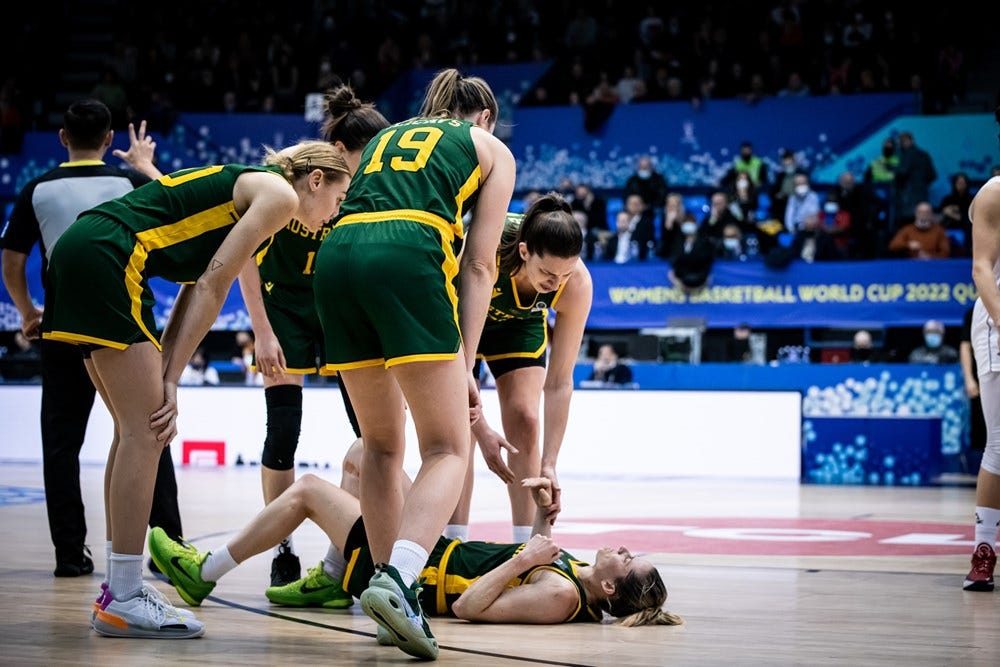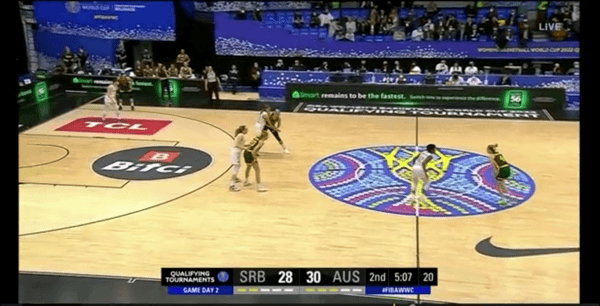Opals fall short in dramatic encounter with Serbia
Bec Allen and Sami Whitcomb shone but Serbia's stifling defence proved too much down the stretch.
Heading into the World Cup qualifiers, Australia and Serbia were the fancied teams to finish 1 and 2 in Belgrade, Group A. The last time these two nations faced off was at the quarterfinals at the Rio Olympics in an emotional thriller that saw Serbia triumph, 73-71. It’s safe to say that there was much anticipation surrounding the long-awaited rematch, and the game did not disappoint.
Both teams raced out of the blocks in a fast paced and high scoring opening quarter. Picking up right where they left off in the game against Brazil, the Opals showed a clear intention to be aggressive on defence. Allen and Talbot were the early standouts on that end of the floor, utilising their length and quick hands to get Australia’s transition game firing on all cylinders.
In contrast to their previous game, which saw them shoot a measly 20% from the perimeter (6/29), the Opals seemed determined to find more efficient scoring opportunities inside the arc, which was an effective tactic. The Serbians employed the same method, searching for Tina Krajisnik in the low post and looking for Yvonne Anderson to attack driving lanes, which was similarly rewarded on the scoreboard. By the end of the first term, there was little separating the two squads.
In the 2nd quarter Australia began to wrestle control. Through dribble penetration the Opals were able to find open looks from the perimeter with Tess Madgen and Darcee Garbin knocking down long-range shots, set up by Allen and Whitcomb respectively. Not long later, Whitcomb connected on a trademark pull-up 3 and the Opals seemed to be flexing their muscles.
Despite the barrage, Serbia managed to stay close on the scoreboard. Anderson was single-handedly keeping the host nation within striking distance, attacking the hoop and getting to the foul line at an incredible rate. Serbia was also controlling the glass, and their ability to secure multiple offensive rebounds throughout the first half was helping to breathe life into their offence.
One of the most pivotal moments in the game came late in the 2nd quarter. While Serbia’s trademark press defence had not garnered the number of steals that they were hoping for, up to that point, it was clear that it was beginning to trouble the Australian side. This pressure came to a head when Talbot received an inbound pass and was subsequently swarmed by Jovana Nogic. Talbot threw an elbow over her shoulder which connected with Nogic’s face, sending her to the floor. While some may argue that this should have been classified as an unsportsmanlike foul, upon review it was clear that some contact was intentional. Citing violence, the Polish referee deemed it to be a disqualifying foul and Talbot was ejected from the game.
At the start of the third quarter Serbia had pegged Australia’s lead back to just two points. The Opals did well to keep their noses in front for the majority of the term, until Aleksandra Crvendakic knocked down a step-back three in isolation which levelled the score and got the Serbian fans roaring.
This was closely followed by a timeout by the Serbian coach, who gave an impassioned plea to her players to ramp up their defensive pressure and to play with speed. The team answered her call emphatically and carried that intensity into the final quarter.
Serbia opened the fourth with determination, forcing three consecutive turnovers and setting the tone for the remainder of the game. Their defence overwhelmed the Opals and culminated in a total of 22 turnovers from the Aussies. When Serbia took the lead outright from an and-1 play by Anderson, they never looked back. Despite a gritty performance by Whitcomb down the stretch, and a late triple from Allen to cut the lead back to five points, Serbia was able to hold on. The final score was 78-71.
While the Opals weren’t able to come away with the victory, this should be viewed as a largely positive game from the team. One of the biggest concerns for the Australian side at Tokyo was their inability to get consistent production from their perimeter players. Of those that remain on the team, Allen was down on form and confidence and Talbot was carrying a foot injury, which greatly hindered her performance at the Olympics. Both players have bounced back spectacularly in Belgrade, and the addition of Sami Whitcomb has formed a starting perimeter trio that has legitimate two-way power, which was demonstrated in today’s encounter. While they might not have been able to maintain and execute their aggressive defence throughout the entirety of the game, the signs early on are looking very promising.
On the offensive end, Allen seems to have found another gear. Historically, the small forward has been a phenomenal play finisher with her elite three-point shooting, however in the game against Serbia she flashed an ability to be a playmaker for others, which we’ve not seen much of previously. Standing at 6’2 she has the ability to leverage her height to find player’s in scoring opportunities, especially coming out of the pick and roll. If this is sustainable, it could help alleviate some of the pressure on the team’s inexperienced point guards.
Another promising sign was the scoring production that the Opals got from their bench. Tolo has always been a dependable option, however there have been question marks about the depth beyond her. Darcee Garbin (7 points), Tess Madgen (6 points) and Sara Blicavs (4 points), all found ways to impact the scoreboard when they hit the floor, which ensured that the Opals’ offence was multidimensional, and took a great load off the shoulders of Australia’s heavy hitters.
Despite the positives, the backup point guard position remains a problem for the Opals that needs to be addressed. The trio of Maddy Rocci, Shyla Heal and Kristy Wallace were brought into this team to help provide an answer, however all three saw little to no court time against Serbia. Given how close the game was, as well as how inexperienced all three players are at this level, it is understandable that Brondello didn’t feel comfortable throwing them into the fire.
As a result of this decision, Whitcomb played almost all of the game at the 1 position, and while she was a huge asset on the court (18 points and 6 assists), her 7 turnovers indicate that she needed a running mate down the stretch. Furthermore, it could be argued that giving Whitcomb extended minutes off the ball would help maximise her skillset as an elite catch and shoot threat.
It’s a tricky balancing act that Brondello needs to play. If she gives more minutes to the young guards, there is no guarantee that the result changes. On the flip side, keeping those players on the bench is solving no problems for the national team in the long run. We are only two games into the tournament however, and perhaps it is unrealistic to expect all kinks to be ironed out at this point in time, particularly considering the transition period that the Opals are currently in.
It will be a quick turnaround for the Aussie side, who take to the floor once again against Korea at 1am tomorrow morning. The game provides the team with another opportunity to build on the progress they’ve made in Belgrade, as well as a chance to address some concerns that have arisen. It should be another hard-fought encounter for the Opals, so make sure to set your alarms early!








Not sure I agree that it was a largely positive game for the Opals. We crumbled against an understrength Serbian team despite playing our "play to win" lineup rather than a "get some experience into the youngsters" rotation. I can understand 3 virtual rookies in the backcourt being ineffective/unused, but i expected much better from the likes of Smith & George.